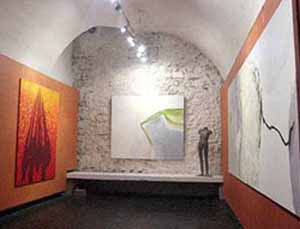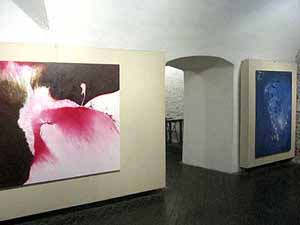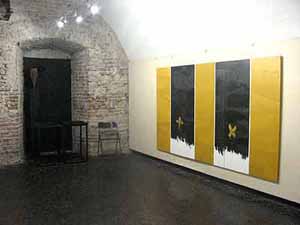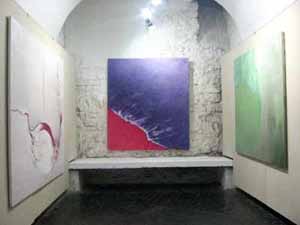 In case of Agnieszka Sajda painting we can state about her private legend since it weaves in and occasionally and dramatically brakes in to her life. Hence in this artistic and existential biography we have not to do with something like methodically treated development, but mosaic of time bits stressed with nostalgia-recollection of time spent in the Academy of Fine Arts in Krakow and painting happenings inspired by the literature, arts and experience of self inspiration. Her works took variety of three-dimensional forms on her way of her artistic development. Finally she concentrated on single picture, as an extension imbedded in relation with her body that is busy with painting. It is shown by not accidental format of her canvases-field of activity as well as painting it self having its corporal third dimension, being shown by continuing painting on sides of stretcher bars that is an integral composite of the picture. Agnieszka's paintings call back to “action panting” and “gesture”, where artist’s flesh and body took similar role making a trace on canvas. This considers also gesture way of applying paint on canvas that sometimes flowing and dripping and sometimes takes shape of hieratic forms opened to fortuity.
In case of Agnieszka Sajda painting we can state about her private legend since it weaves in and occasionally and dramatically brakes in to her life. Hence in this artistic and existential biography we have not to do with something like methodically treated development, but mosaic of time bits stressed with nostalgia-recollection of time spent in the Academy of Fine Arts in Krakow and painting happenings inspired by the literature, arts and experience of self inspiration. Her works took variety of three-dimensional forms on her way of her artistic development. Finally she concentrated on single picture, as an extension imbedded in relation with her body that is busy with painting. It is shown by not accidental format of her canvases-field of activity as well as painting it self having its corporal third dimension, being shown by continuing painting on sides of stretcher bars that is an integral composite of the picture. Agnieszka's paintings call back to “action panting” and “gesture”, where artist’s flesh and body took similar role making a trace on canvas. This considers also gesture way of applying paint on canvas that sometimes flowing and dripping and sometimes takes shape of hieratic forms opened to fortuity.
 But complexity of the artist inspiration (often rooted in literature) do not let her to use only free improvisation and she puts her emotions in some more subtle color workouts, makes up with delicate drawing bringing up variety of moods. Her paintings are seemingly looking abstract. Although after closer look we can see familiar shapes corresponding to landscape or figure. Although appearance of Agnieszka's paintings has different sense fully accepted by her. This means, there is number of readings and impressions in these paintings associated with pleasure when looking at them. Each of them is different.
But complexity of the artist inspiration (often rooted in literature) do not let her to use only free improvisation and she puts her emotions in some more subtle color workouts, makes up with delicate drawing bringing up variety of moods. Her paintings are seemingly looking abstract. Although after closer look we can see familiar shapes corresponding to landscape or figure. Although appearance of Agnieszka's paintings has different sense fully accepted by her. This means, there is number of readings and impressions in these paintings associated with pleasure when looking at them. Each of them is different.
 She says that some of that impressions of spectators of her particular work are similar or almost the same. For example, a picture that she would name “a bay seen from above by a flying bird” is being to call by some of her friends independently (without consulting each other) “a frog’s leg”. A propos, Agnieszka do not title her works, but she says that she would not have anything against the challenge and give a work a title according to the above impression of her friends. Concluding my article about Agnieszka’s works I am taking again a look at some of them sent to me by e-mail and let my mind to make as free as possible interpretations. Here you go for example a painting that supposed to represent a hat of one of the protagonists of the story by Haruki Murakami “The Wind-Up Bird Chronicle”.
She says that some of that impressions of spectators of her particular work are similar or almost the same. For example, a picture that she would name “a bay seen from above by a flying bird” is being to call by some of her friends independently (without consulting each other) “a frog’s leg”. A propos, Agnieszka do not title her works, but she says that she would not have anything against the challenge and give a work a title according to the above impression of her friends. Concluding my article about Agnieszka’s works I am taking again a look at some of them sent to me by e-mail and let my mind to make as free as possible interpretations. Here you go for example a painting that supposed to represent a hat of one of the protagonists of the story by Haruki Murakami “The Wind-Up Bird Chronicle”.
 And in the drawing I find something of Japanese fan or erotic picture in shape of a ruffled petticoat like in Blemer's. Also something of postmodern Japanese Mangha, Buddhist intensive colored paintings in addition with Pollock wise dripping (what takes shape in works — as they called him Japanese Warhol — of Takahashi Murakami). However all of this filtered by, here quotation from review of the Haruki’s Murakami book by Helena Zaworska: “(...) Undiscovered at the bottom secret of each personality, made up with opposite, fighting each other, conscious and unconscious features of human nature”. So i.e. color, drawing, shape and composition of the whole not fully controlled in encounter with imagination entangled (by a piece of work) in “embroilment of al kinds of odd existence”. So I would finally say.
And in the drawing I find something of Japanese fan or erotic picture in shape of a ruffled petticoat like in Blemer's. Also something of postmodern Japanese Mangha, Buddhist intensive colored paintings in addition with Pollock wise dripping (what takes shape in works — as they called him Japanese Warhol — of Takahashi Murakami). However all of this filtered by, here quotation from review of the Haruki’s Murakami book by Helena Zaworska: “(...) Undiscovered at the bottom secret of each personality, made up with opposite, fighting each other, conscious and unconscious features of human nature”. So i.e. color, drawing, shape and composition of the whole not fully controlled in encounter with imagination entangled (by a piece of work) in “embroilment of al kinds of odd existence”. So I would finally say.